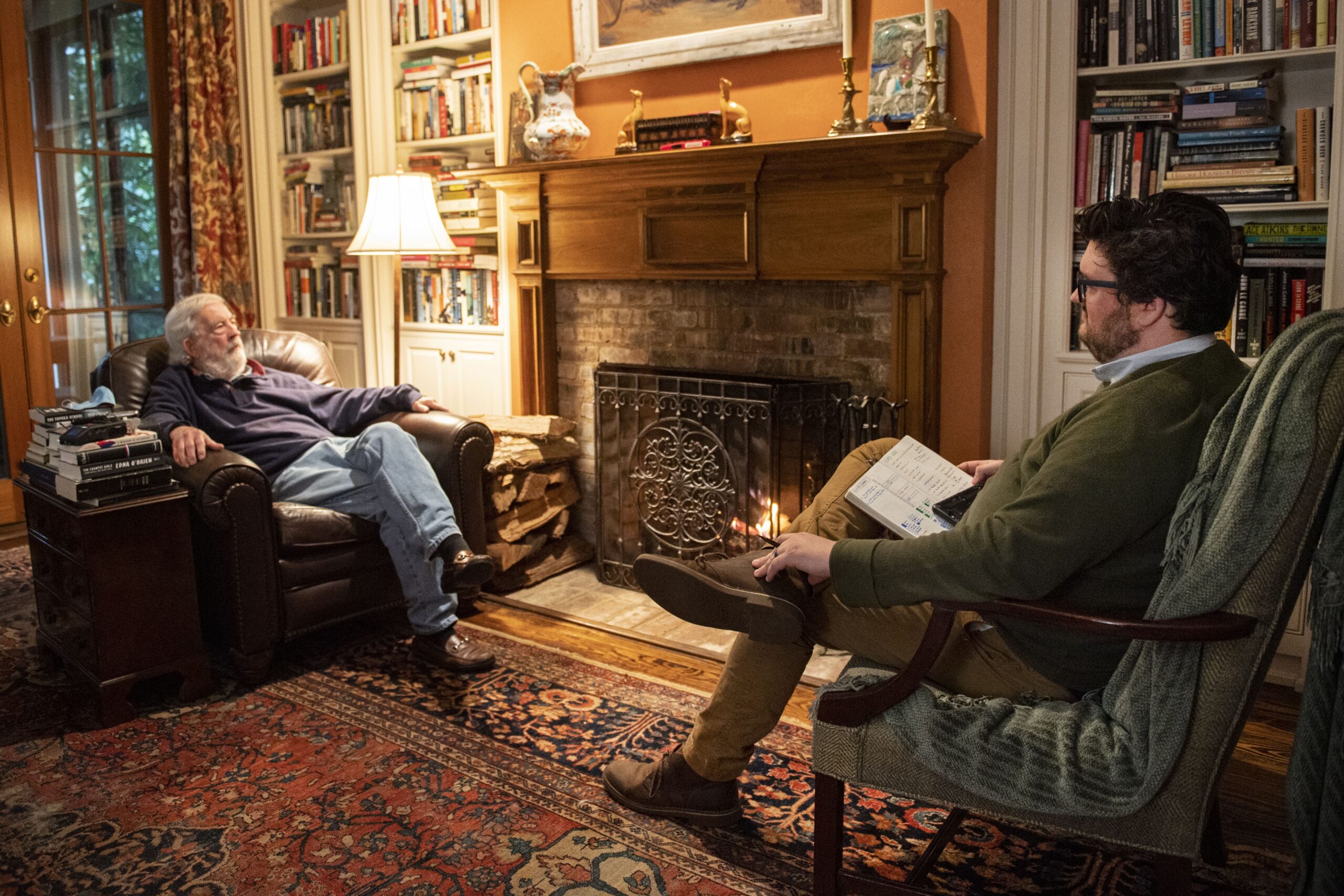
When was the last time you stayed out way too late chatting with a friend?
Maybe you had your best friend over to your house for dinner. Or did you meet a new friend for a coffee that turned into dinner that turned into a round of drinks? You both had other things to do, but there wasn’t a long enough lull in the conversation for anyone to leave, so you kept talking until the bar closed.
What were you doing? Probably telling stories.
Stories about your day, your life, and your goofy uncle who visited last weekend. You were telling stories to slowly unveil yourself to someone new or catch an old friend up on everything they missed.
Stories are educational and historical, powerful and profitable. They start wars and sustain peace. They’re the bedrock of building stronger societies and better organizations.
Plus, it’s just fun to share stories.
My obsession with storytelling took hold at the University of Mississippi.
(Watch your feet, I’m about to drop some names.)

I took classes from storytelling powerhouses like Curtis Wilkie and Tom Franklin. Local storytelling legends like Melanie Addington, the local reporter, and Richard Howorth, the owner of the nation’s greatest small bookstore, taught me the craft. I witnessed firsthand the birth of the next generation of Southern storytellers, including Alex McDaniel and Adam Ganucheau.
Hell, I worked for a chef who named his menu items after short story collections written by a local volunteer fireman (the all-time great storyteller Larry Brown).
This isn’t to say I’m some magical storyteller. It’s just easy to notice the power of storytelling when you’ve spent time with a group like this.
I was lucky enough to spend nearly 15 years in and around a city built on stories, commuting daily from the city of Elvis’s birth to the town of William Faulkner’s life.
Along the way, I learned the most important lesson of my life so far:
The stories we tell ourselves about our past shape our future.
They inform our culture and our behavior. They influence our perceptions of others and ourselves. They create in-groups and out-groups. They set a rubric for what your community will tolerate or won’t.
Stories even affect our physical health. Don’t take my word for it. Brené Brown has been researching this for decades.
Stories influence how long we live, how we treat others, and the types of people our children grow into.
As a storyteller, I am morally obligated to be careful and intentional with each story I craft. And I have a responsibility to help people tell better stories.
After all, it’s a matter of life and death.
Your story informs your culture, and culture beats policy almost every time.
You can write as many policies as you want, but your company’s story and culture will dictate how employees perform.
It doesn’t matter if you have a proofing hierarchy policy when a leader consistently circumvents it. It doesn’t matter if there is a sick leave policy if department heads still expect employees to complete the same level of work when they’re out.
You tell a story with your spoken language, body language, and lived language. And the story you tell sets a standard.
Jeremy Meuser researches leadership and how different leadership styles affect performance and health. I had the honor of interviewing him, and he broke it down like this:
“I had this moment of clarity where I said, ‘OK, leadership matters for the well-being of organizations, which means the well-being of the economy, which means the well-being of society, which means for the well-being of individuals, their ability to live and their mental health,’” Meuser said.
Do you remember the BP oil spill? When a brand that touts its “clean” approach to energy spilled 205.8 million gallons and 225,000 tons of methane into the Gulf of Mexico. And then the CEO said, “There’s no one who wants this over more than I do. I’d like my life back.”
That’s an example of a brand telling one story with their words and living another with their actions.
If that brand was a person, we would call them a liar—OR at least unreliable.
Your brand tells a story through external communications, customer services, and public image.
The story you tell influences how people perceive your brand. You can tell a creative, hopeful, inspiring, bold, or helpful story. But the real story—the story your public will remember—is at the intersection of your words and actions.
How did you make them feel?


I used to live in a special place called Tupelo, Mississippi. Tupelo is a lighthouse in a sea of tiny rural communities for hundreds of miles in every direction.
If you ask anyone who knows the place what makes it so unique, they’ll tell you it’s the “Tupelo Spirit.”
Tupelo’s leaders have long emphasized community development, not just in the commercial/industrial sense. The city invests heavily in education, philanthropy, recreation, health, and other quality-of-life issues. One of the reasons is because of the story the
community tells. When someone new moves to Tupelo, they hear from the many organizations working to strengthen the community from the inside out. They are indoctrinated in the Tupelo Spirit. But then, most importantly, they are invited to participate in the story’s next chapter.
The story your community leaders tell with their words, laws, and actions influences how invested the next generation will be in community building.
During my previously mentioned interview with Dr. Meuser, he said something that opened an entirely new neural pathway in my brain (and literally changed the way I work and parent):
“We know the sins of the parents are revisited in their children, and emotional energy is transferred from a bad relationship with a supervisor into the home. So, leadership matters for all of our futures.”
The stories we tell ourselves about work, home, and society aren’t siloed. They all impact each other. How we talk about ourselves and our families can affect our relationships, longevity, and health.
Seriously.
Generational trauma is often as much a storytelling issue as a health issue. In fact, storytelling is a massive piece of many mental healthcare approaches.
Telling each other stories can help. Sharing our fears and shame reduces stress, builds connection, and tackles resentment.
The great and good Anne Lamotte calls it writing a Shitty First Draft.
Think about how major Mesopotamian religions all have flood stories. There was a flood, and each community had a different way of explaining it. Some folks still use scary religious stories to explain natural disasters, but most of us opt to talk about the weather. It’s the most common story in a diner or coffee shop.
When the human brain can’t explain something, it begins to map stories onto that enigma until it can be understood.
Telling a better story starts with telling a story. If you don’t tell a story, the brains around you will start telling a story to fill the gap.
So what can you do about it?
I like Lamotte’s approach. I start with shitty first drafts. Shitty first drafts usually rely on emotions, good and bad. But once you have identified all the pieces of the story you’ve already been telling, you can seek out facts and actions to back it up. And you can edit the parts you don’t like.
Sometimes, that means changing the words; other times, it means changing the actions. Either way, you owe it to those around you to start taking better care of the stories you’re telling.
I work with businesses, nonprofits, and individuals to help craft better stories. Some of my clients say it’s like therapy. Others just say it’s helpful.
Either way, auditing your story is the first step in growing, evolving, or even pivoting.
Share this post: